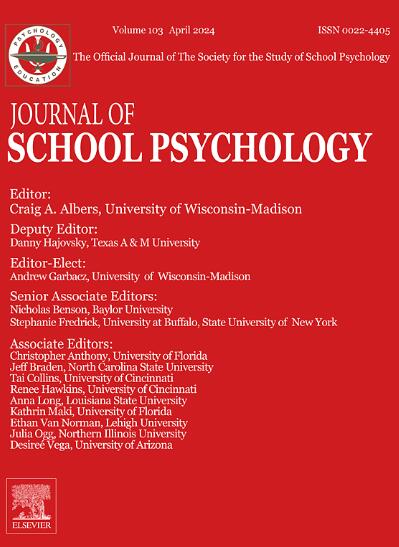教师对儿童遭受同伴伤害的应对措施的看法:教师和学生之间的一致意见(和不一致意见
IF 4.1
1区 心理学
Q1 PSYCHOLOGY, SOCIAL
引用次数: 0
摘要
最近的研究强调了教师对学生同伴伤害行为的反应以及学生对教师如何应对这种 伤害行为的期望的重要性。然而,很少有研究探讨教师和学生在多大程度上对教师处理同伴伤害问题的努力或缺乏努力有共同的理解。本研究利用从 26 个四年级和五年级班级收集到的 410 名学生(47.1% 为男生;86.8% 为白人;年龄 = 10.29 岁)的纵向数据来探讨这一问题。在秋季和春季,学生们报告了他们的老师使用六种应对同伴伤害的方法,而老师们也完成了他们使用这六种方法的自我报告。秋季则收集了同伴对攻击行为和同伴受害情况的报告。结果发现,只有三种教师应对措施(包括联系家长、建议独立应对(即告诉学生自己处理)和建议回避)在同学之间有明显的一致性,而且几乎没有迹象表明,同性别的同学之间或攻击行为或同伴伤害行为严重或轻微的儿童之间有更大的一致性。总体而言,教师与学生之间在教师使用六种应对策略方面几乎没有关联。基于这些研究结果,应将培养学生对参与欺凌的后果和期望的共同理解作为反欺凌干预措施的潜在目标。本文章由计算机程序翻译,如有差异,请以英文原文为准。
Perceptions of teachers' responses to children's peer victimization: Agreement (and lack of agreement) among teachers and students
Recent research has underscored the importance of teachers' responses to students' peer victimization as well as students' expectations for how their teacher responds to this victimization. However, little research has examined the extent to which teachers and their students have a shared understanding of their teacher's efforts, or lack of efforts, to manage peer victimization. This study addressed this issue using longitudinal data collected on 410 students (47.1% boys; 86.8% White; Mage = 10.29 years) from 26 fourth-grade and fifth-grade classrooms. In the fall and spring, students reported on their teacher's use of six responses to peer victimization and teachers completed self-reports of their use of these same six responses. Peer reports of aggressive behavior and peer victimization were obtained in the fall. Significant agreement among classmates was found for only three teacher responses, including contacting parents, advising independent coping (i.e., telling the student to handle it on their own), and suggesting avoidance, and there was little indication that there was greater agreement among same-gender classmates or among children either high or low in aggression or peer victimization. Overall, there was little association between teachers and their students as to the teachers' uses of the six response strategies. Based on these findings, fostering a shared understanding of the consequences and expectations regarding students' engagement in bullying should be examined as a potential target of anti-bullying interventions.
求助全文
通过发布文献求助,成功后即可免费获取论文全文。
去求助
来源期刊

Journal of School Psychology
PSYCHOLOGY, EDUCATIONAL-
CiteScore
6.70
自引率
8.00%
发文量
71
期刊介绍:
The Journal of School Psychology publishes original empirical articles and critical reviews of the literature on research and practices relevant to psychological and behavioral processes in school settings. JSP presents research on intervention mechanisms and approaches; schooling effects on the development of social, cognitive, mental-health, and achievement-related outcomes; assessment; and consultation. Submissions from a variety of disciplines are encouraged. All manuscripts are read by the Editor and one or more editorial consultants with the intent of providing appropriate and constructive written reviews.
 求助内容:
求助内容: 应助结果提醒方式:
应助结果提醒方式:


